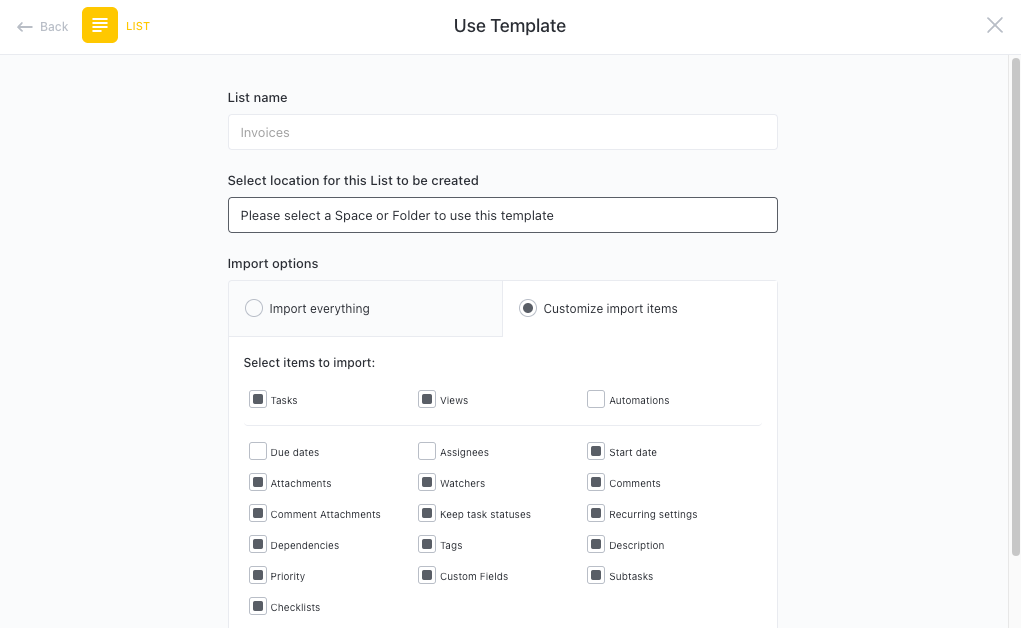Whether you’re designing for print or digital, keeping your brand coherent requires consistency. That’s where ClickUp's Style Guide Template comes in! This template is essential for streamlining your design process and ensuring that everyone on your team adheres to the same style guide.
The Style Guide Template helps you:
- Organize all of your branding elements in one place
- Keep visual elements consistent across all platforms
- Communicate expectations about design decisions with team members
With the Style Guide Template, you can easily create a unified look and feel for your organization—whether you’re building websites, designing logos, updating social media accounts or producing marketing materials. Get started now and take control of your brand!
Benefits of a Style Guide Template
Having a style guide template in place is essential for any business that wants to maintain a consistent and professional look and feel across all of their marketing collateral. Using a style guide template can provide several benefits, such as:
- Ensuring all materials are consistent and look professional
- Improving brand recognition and trust with customers
- Helping save time by having a set of standards that can be followed
- Reducing costs by avoiding unnecessary reprints or revisions
Main Elements of a Style Guide Template
ClickUp's Style Guide Template is designed to help teams keep brand consistency across all their design assets. This Doc template includes:
- Custom Statuses: Create tasks with various custom statuses to keep track of the progress of each style element
- Custom Fields: Categorize and add attributes to manage your style elements and maintain brand consistency
- Custom Views: Start with this Doc template and build out your ClickUp workflow which includes List, Gantt, Workload, Calendar, and more
- Project Management: Improve style guide tracking with task dependencies, multiple assignees, status labels, and more
How to Use a Style Guide Template
Creating a style guide is an important step to ensure that your brand is consistent and recognizable to your customers. By following these steps, you can easily create and maintain a style guide for your business:
1. Brainstorm a list of brand elements
Start by writing down a list of all of the elements that define your brand. These could include your logo, typography, colors, iconography, photographs, and other visual elements.
Use a Doc in ClickUp to brainstorm and store all of the elements that define your brand.
2. Collect examples
Once you’ve identified key elements of your brand, it’s time to start collecting examples of how they should be used. This includes things like color codes, font sizes and types, and logo specifications.
Create a Board view in ClickUp to collect examples of how your brand elements should be used.
3. Establish guidelines
After collecting examples, you can establish guidelines for how each element should be used. This will help ensure that everyone is on the same page when it comes to using your brand’s elements.
Create tasks in ClickUp to set guidelines for the use of each brand element.
4. Share the style guide
The last step is to share the style guide with your team. Make sure that everyone has access to the document so that they can refer to it whenever they need to use the brand elements.
Share the Doc in ClickUp with your team and set up email notifications so they can stay updated on any changes.
Get Started with ClickUp's Style Guide Template
Content creators can use this Style Guide Template to help everyone stay on the same page when it comes to establishing and maintaining design consistency.
First, hit “Add Template” to sign up for ClickUp and add the template to your Workspace. Make sure you designate which Space or location in your Workspace you’d like this template applied.
Next, invite relevant members or guests to your Workspace to start collaborating.

Now you can take advantage of the full potential of this template to create a style guide:
- Create a project for each company style guideline
- Assign tasks to team members to create content and guidelines
- Collaborate with stakeholders to ensure rules are consistent and up to date
- Organize tasks into categories to keep track of progress
- Set up notifications to stay up-to-date on progress
- Hold regular meetings to discuss progress and any issues
- Monitor and analyze tasks to ensure maximum productivity
Get Started with Our Style Guide Template Today








